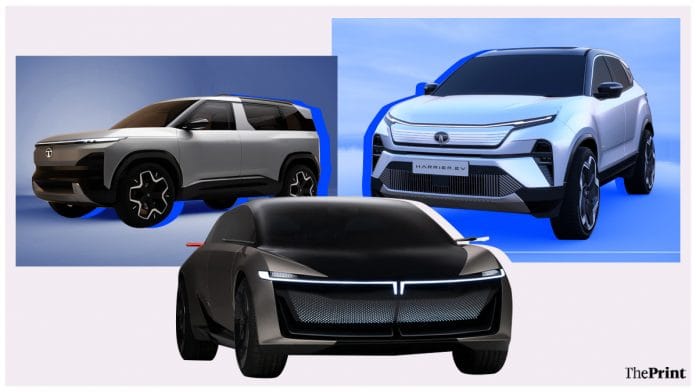Greater Noida: At a time when there is a lot of talk about the emergence of electric vehicles (EVs), the fact of the matter is that they are now mainstream, with both customers and manufacturers embracing the technology, Vivek B. Srivatsa, Head, Marketing, Sales and Service Strategy at Tata Passenger Electric Mobility, told ThePrint.
Srivatsa added that Tata Motors aims to sell 50,000 EVs in the current financial year. “We have already sold 50,000 EVs in the last three years, which is not a small number,” he said in an interview to ThePrint. “We will deliver 50,000 in just one year (FY 2022-23). So, an EV company is among the top 10 manufacturers of the industry. There is no other proof (required) that EV is now mainstream.”
He also pointed out that every single exhibitor at the Auto Expo 2023 has either launched EVs or close-to-production EV concepts. “That clearly is a sign that EVs are the future and when you have every single manufacturer launching EVs, it’s a clear sign to the customer that all manufacturers are embracing EVs.”
Tata Motors is eyeing at least 25 per cent of its sales to be from EVs in the next five years, and sees this growing to 50 per cent by 2030. Currently, EVs account for 9 per cent of vehicle sales for the homegrown automobile major.
At the product level — where the company sells a model in internal combustion engine (ICE) and electric variant, the penetration of electric is almost 30 per cent. For example, the company sells about 15,000 units of Tata Nexon every month, of which 30 per cent is electric.
Also Read: India key market, could become No.1 automobile manufacturer, says Toshihiro Suzuki at Auto Expo
Ten more EV models by 2025
The company, which currently has a portfolio of three electric vehicles, aims to have 10 EV models on the road by 2025.
At the Auto Expo, it unveiled three products — pure EV ‘Avinya’ which will be launched late 2025, its first all-wheel-drive electric SUV Harrier which will be launched in 2024, and electric SUV Sierra which will be launched in 2025.
“To reiterate, the question of EVs being the future is completely accepted by customers,” Srivatsa said. “When we speak to our customers, it’s not a question of ‘if I buy an EV’, it is about ‘when I buy it’. That change has completely happened. So we are confident about the prospect of India becoming one of the leading countries in terms of e-mobility.”
“Tata Motors wants to become net zero by 2040 as a passenger vehicle business,” he added. “One of the key levers worldwide to reduce emissions from the automotive space is the shift to electric combined with greenification of the entire energy generation.”
Srivatsa added that a lot of people are skeptical that EVs just move the tailpipe emissions to power generation. “That could be a fact currently, but we can’t start electric vehicle infrastructure then… both have to operate in parallel.”
Asked about other technologies, such as hybrids and alternative fuels, Srivatsa said these technologies will act as bridge technologies in the move towards EVs. “These might be solutions currently to help manufacturers support their Corporate Average Fuel Economy (CAFE) requirements where there are severe penalties involved,” he said. “Also, EV developments will take some time, so these are transitionary solutions.”
However, he did admit that while the growth of ICE vehicles will slow down, they will not fade out. “Tata Motors continues to invest in ICE because we believe as a company, we have a lot of growth left in ICE as well,” he said. “So, our growth will be powered both by ICE and EVs.”
Replying to a query on tax benefits that EVs get (GST at 5 per cent and also road tax exemption in some states), he said these need to continue or the growth towards sustainability will slow down. “Tax benefits should continue because EVs are going to significantly reduce the import subsidies that the government has to give to import fossil fuels,” he added.
“It’s a huge bill for the exchequer. India is power sufficient and running EVs will not impose any additional import bills for the government.”
(Edited by Smriti Sinha)
Also read: Expecting Indian automobile industry to grow by 6-7% in FY 2023-24, says MG Motor India MD






